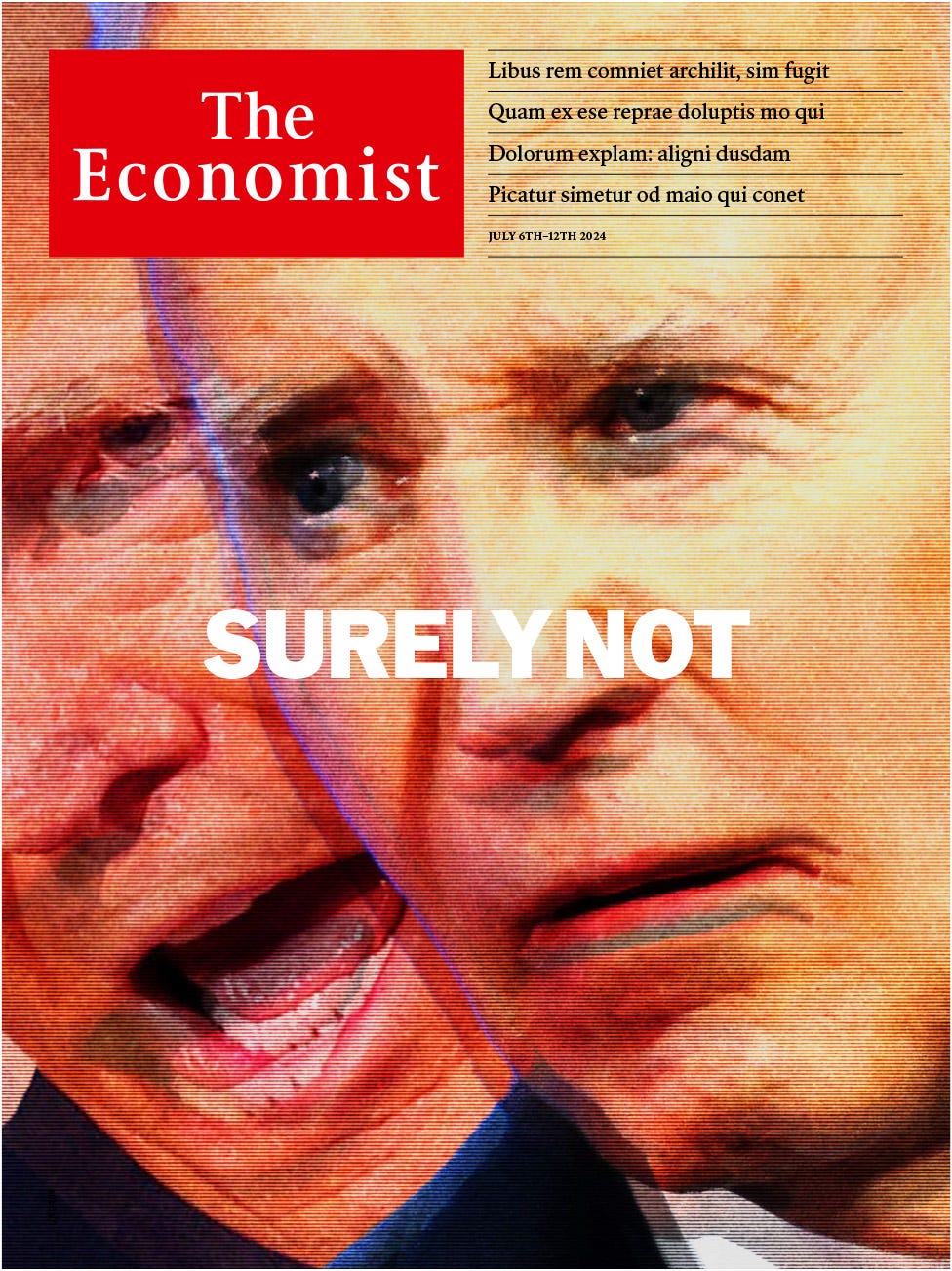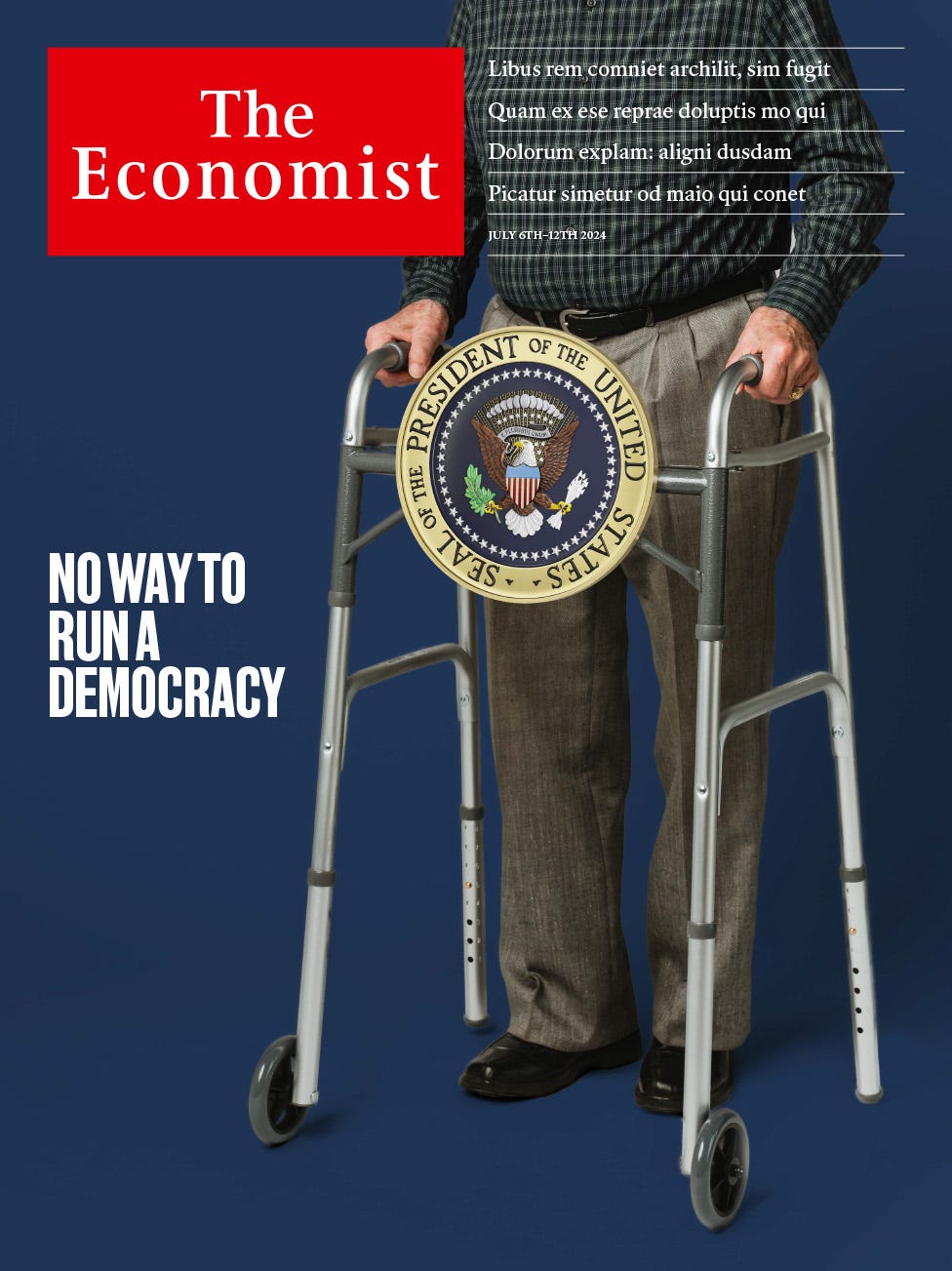Opinion: The Economist Cover Attempts to Convey the Biden Situation Post Debate
By Denise Rivette
The situation facing President Joe Biden after the June 27th presidential debate is the subject of this week’s The Economist cover. The process the editorial team went through from concept to cover is, as usual, an excellent summary of the issue itself.
They began their coverage with the following:
“Mr Biden had planned for the presidential debate on June 27th to prove his critics wrong about the decline in his mental abilities, and so to revive his ailing campaign. Instead he struggled for 90 agonising minutes to recall words and facts and was unable to land arguments against a weak opponent. It was a catastrophe.
Mr Biden is blameless for his failing powers, but not for the cover-up that followed the debate. Abetted by his family, senior staff and Democratic elites, the president has insisted that he is still up to the world’s toughest job. The folly behind that falsehood became the central thrust of our argument.”
The Economist editors started from the position that Biden deserves to be remembered for “his accomplishments and his decency rather than his decline.” But they couldn’t deny that there is no getting away from the fact that “his mental and physical competence have become central to this race.” They strove to represent that “without being crass or cruel.” They started with the above representation of a podium with dentures in a glass. They decided that the image was “off-putting” and the false teeth on the lectern veered into “Monty Python territory.”
They then tried an image of a recliner flanked by the American and presidential flags on a rug reminiscent of the oval office in an effort to contrast the fitness of the man with the demands of his position. “Mr Biden can still appear dynamic during short, scripted appearances. But you cannot run a superpower by autocue. And you cannot put an international crisis on hold because the president is having a bad night.” This image, too, failed to convey the full story.
Moving forward, the above image was proposed. “As the head of state, America’s president embodies the virtues of the republic. The more he is seen as a stubborn old man who leaves the real work to his courtiers, the more he will undermine Americans’ faith in their system of government.”
The editors felt this failed to convey their anger at the Democratic Party’s hypocrisy. “Mr Biden’s campaign team insist that the president works so hard he leaves his staff drained. His supporters argue that those awful 90 minutes should not overshadow the past three and a half years. But what matters is whether they foreshadow the next four. For years they have sneered at Republican politicians’ failure to stand up to Donald Trump, and here they were failing to be straight about Mr Biden.”
The above image conveyed their anger, and they might have gone with it except for rumours that Democrats were beginning to speak out against Mr Biden. Had Biden done “the honourable thing this weekend, and withdrew from the race, our cover would rightly seem to be a cruel misjudgment of the man and his character.”
They eventually settled on a cover based on the above image of a man with a walker bearing the presidential seal. The editors found the image of a man who was clearly not Biden confusing. By taking him away, however, they could put the focus on the presidency while also having a cover that would make sense if the president pulled out of the race.
There was some concern that the image might be interpreted as making fun of the physically infirm. They felt the walker (‘Zimmer’ as they refer to them across the pond) is a “universal symbol of failing powers even if, obviously, you can struggle to walk without struggling to think. You only have to be aware of the context to know that we are not saying that physically disabled people should be barred from serving as president.”
While The Economist editors are aware that people may feel that criticising Biden is simply too harsh, they believe harshness is justified here. “The Biden team are campaigning on the claim that a Trump presidency would be a disaster for America. Yet their attempts to shore up their candidate contradict what tens of millions of Americans saw with their own eyes. That will only make a Trump presidency more probable.”
In concluding their review of their process, they stated, “A few Democrats have called for Mr Biden to step aside. To bring about the political renewal that America now so clearly needs, more must come forward. It is not too late.”
The Economist prepared a separate image for their digital edition featuring Britain’s new prime minister, Sir Keir Starmer. Their opinion is that the change is good for Britain. “A country that was one of the first in the West to succumb to populist radicalism when it voted for Brexit has picked a serious-minded centrist who pledges stability.”
To this editor’s ear, a serious-minded centrist who pledges stability sounds pretty good right now.








